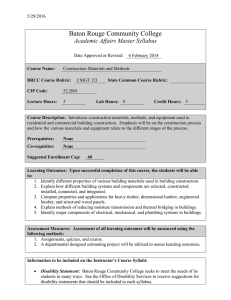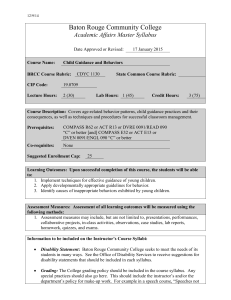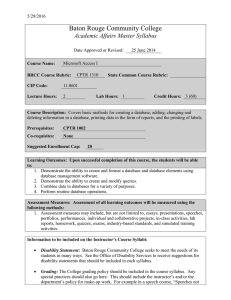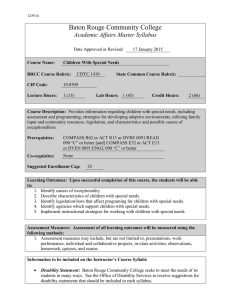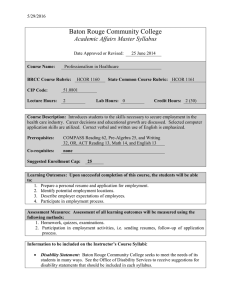Baton Rouge Community College Academic Affairs Master Syllabus
advertisement
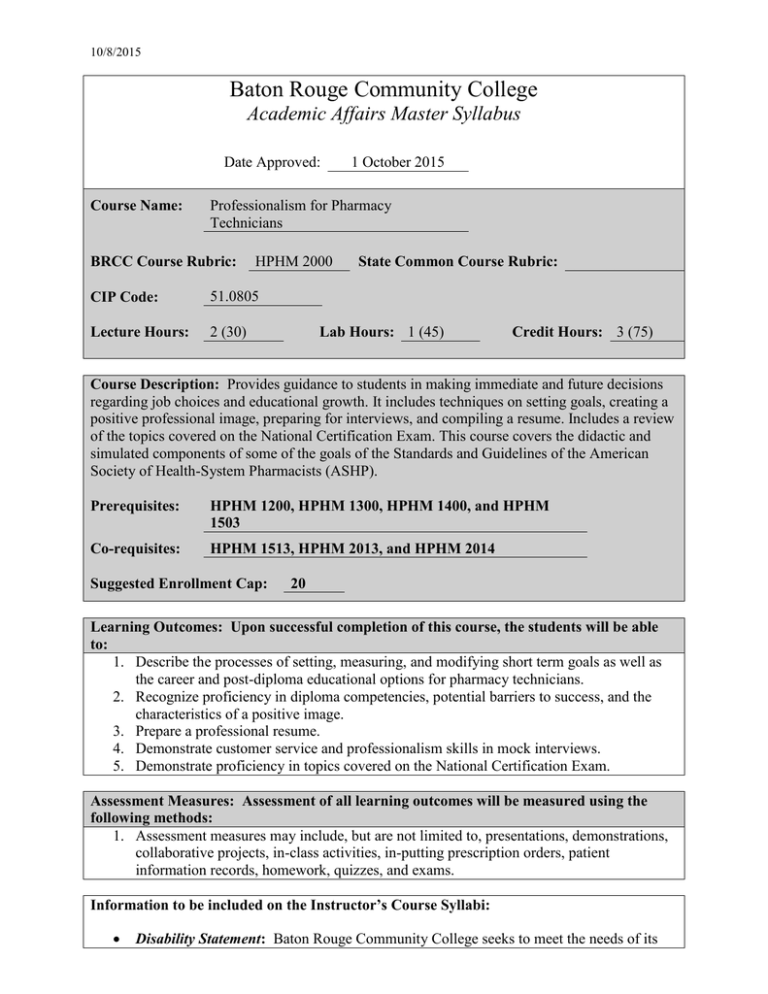
10/8/2015 Baton Rouge Community College Academic Affairs Master Syllabus Date Approved: Course Name: 1 October 2015 Professionalism for Pharmacy Technicians BRCC Course Rubric: HPHM 2000 CIP Code: 51.0805 Lecture Hours: 2 (30) State Common Course Rubric: Lab Hours: 1 (45) Credit Hours: 3 (75) Course Description: Provides guidance to students in making immediate and future decisions regarding job choices and educational growth. It includes techniques on setting goals, creating a positive professional image, preparing for interviews, and compiling a resume. Includes a review of the topics covered on the National Certification Exam. This course covers the didactic and simulated components of some of the goals of the Standards and Guidelines of the American Society of Health-System Pharmacists (ASHP). Prerequisites: HPHM 1200, HPHM 1300, HPHM 1400, and HPHM 1503 Co-requisites: HPHM 1513, HPHM 2013, and HPHM 2014 Suggested Enrollment Cap: 20 Learning Outcomes: Upon successful completion of this course, the students will be able to: 1. Describe the processes of setting, measuring, and modifying short term goals as well as the career and post-diploma educational options for pharmacy technicians. 2. Recognize proficiency in diploma competencies, potential barriers to success, and the characteristics of a positive image. 3. Prepare a professional resume. 4. Demonstrate customer service and professionalism skills in mock interviews. 5. Demonstrate proficiency in topics covered on the National Certification Exam. Assessment Measures: Assessment of all learning outcomes will be measured using the following methods: 1. Assessment measures may include, but are not limited to, presentations, demonstrations, collaborative projects, in-class activities, in-putting prescription orders, patient information records, homework, quizzes, and exams. Information to be included on the Instructor’s Course Syllabi: Disability Statement: Baton Rouge Community College seeks to meet the needs of its students in many ways. See the Office of Disability Services to receive suggestions for disability statements that should be included in each syllabus. Grading: The College grading policy should be included in the course syllabus. Any special practices should also go here. This should include the instructor’s and/or the department’s policy for make-up work. For example in a speech course, “Speeches not given on due date will receive no grade higher than a sixty” or “Make-up work will not be accepted after the last day of class.” Attendance Policy: Include the overall attendance policy of the college. Instructors may want to add additional information in individual syllabi to meet the needs of their courses. General Policies: Instructors’ policy on the use of things such as beepers and cell phones and/or hand held programmable calculators should be covered in this section. Cheating and Plagiarism: This must be included in all syllabi and should include the penalties for incidents in a given class. Students should have a clear idea of what constitutes cheating in a given course. Safety Concerns: In some programs this may be a major issue. For example, “No student will be allowed in the safety lab without safety glasses.” General statements such as, “Items that may be harmful to one’s self or others should not be brought to class.” Library/ Learning Resources: Since the development of the total person is part of our mission, assignments in the library and/or the Learning Resources Center should be included to assist students in enhancing skills and in using resources. Students should be encouraged to use the library for reading enjoyment as part of lifelong learning. Expanded Course Outline: 1. Customer service skills and attitude. (Goals 1, 4, 6) 2. Self-motivation. (Goal 5) 3. Working with an established professional as a “shadow”. (Goals 8, 13, 17) 4. Review of program competencies. (Goal 36) 5. Making, measuring, and modifying short-term goals. (Goal 10) 6. Discussion of calls that must be transferred to pharmacist. (Goal 35) 7. Characteristics of a positive image. (Goal 2) 8. Barriers to listening and how to overcome them. (Goal 10) 9. Interpersonal relations skills (i.e., verbal and written). (Goal 3) 10. Preparing a professional resume and cover letter. (Goal 10) 11. Techniques for securing references. (Goal 10) 12. Preparing for an interview. (Goal 3) 13. Inputting all patient information into the patient’s record on the computer. (Goal 23) 14. Entering prescription information into computer. (Goals 18, 25) 15. The importance of conflict resolution in the workplace. (Goal 6) 16. Sources of payment. (Goal 12) 17. Resources that can be used to access drug information. (Goal 16) 18. Alternatives for dealing with harassment, bias, and discrimination based on race, color, national origin, sex, religion, handicap, or age. (Goal 7) 2 3



